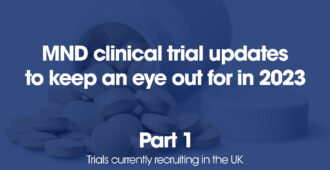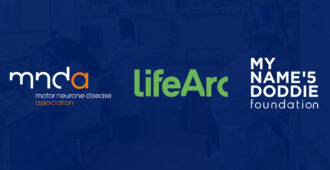This blog is part of the ‘Highlights from Glasgow’ collection of articles, where you can read about the content of some of the talks and posters presented at the 29th International Symposium on ALS/MND.
In the Clinical trials and trial design (4B) session we heard from two speakers looking at ways to improve current design of clinical trials. In his plenary talk, Mahesh Parmar (C20) provided his perspective on the necessity of changes from his experience working on cancer trials, highlighting that any efforts to improve clinical trials should be focused on Phase 3 where the most money and time is spent. One solution that stuck with a lot of clinicians attending Prof Parmar’s talk was the design used in the STAMPEDE trial, a large clinical trial assessing effectiveness of new treatments for people affected by prostate cancer, which has been running since 2005. The innovation of this approach is the ongoing protocol that allows to test multiple treatments within the same established clinical trial, allowing new drug candidates to be tested (relatively) straight away, avoiding the creation of a brand new clinical trial. This design improves efficacy of testing new treatments, systematic approach to testing, and access to a large pool of participants who could take part in multiple treatment trials over time.
Brian Dickie, the Director of Research Development at the MND Association said: “Prof Parmar’s presentation generated a lot of interest amongst clinicians who are regularly involved in MND trials and there was a strong feeling that this is the direction that we need to be taking with MND as it could increase the efficiency and reduce the cost. That said, it will take a while to put the building blocks in place and we certainly wouldn’t want to hold up trials that are already in advances stages of planning, so I would expect to see a gradual introduction of changes to trials design over the coming years.”
You can learn more about the multi-arm multi-stage trial design from Prof Parmar here.

This talk was then followed by Ruben van Eijk (C21) who showed us the importance of genetic stratification in clinical trials. This came after the finding that the drug lithium, which was originally found not to be effective for MND, was effective in a subgroup of participants with UNC13A genetic variation, but not in others. Dr van Eijk and his team further looked at the results from trials that tested the efficacy of valproic acid and creatine and found that the distribution of people carrying specific genetic variations (specifically C9ORF72, UNC13A or MOBP) was imbalanced across the placebo and active drug groups. This could lead to under-representation of each of these subgroups and not enough data to show any potential effect the drug could have on people with a specific genetic variation.
We also heard from Robert Miller (C23) who reported on the recently completed Phase 2 clinical trial investigating the drug NP001. While the drug was found to be safe and well-tolerated, no change was observed in disease progression in people receiving the active drug compared to those on placebo.
Looking at some of the poster presentations, Luis Garcia Gancedo (CLT-08,09,10) showed how biotelemetric monitoring, allowing remote data collection, could provide valuable data assessing the impact of MND on functional capacities and daily living, which could potentially be used as an outcome measure in clinical trials. Matthew Klein (CLT-17) discussed results from a trial testing safety of the drug EPI-589 which is thought to protect cells from neuroinflammation and oxidative stress. EPI-589 was found to be safe and well-tolerated, with promising improvements on disease progression. Similar findings were also found for the drug ezogabine, as presented by Brian Wainger (CLT-21), which works by reducing neuronal excitability, thought to affect survival in MND. The Phase 2 trial confirmed that ezogabine reduced excitability, however, due to a small number of participants, any observable effect will need to be studied in a larger clinical trial.
An update was also provided on FORTITUDE-ALS (CLT-24), a Phase 2 clinical trial investigating effectiveness of reldesemtiv, which is now fully enrolled with first results to be expected in the first half of 2019.
Find out more about the topics discussed in Glasgow on our Periodic table of Symposium at www.mndassociation.org/symplive.





